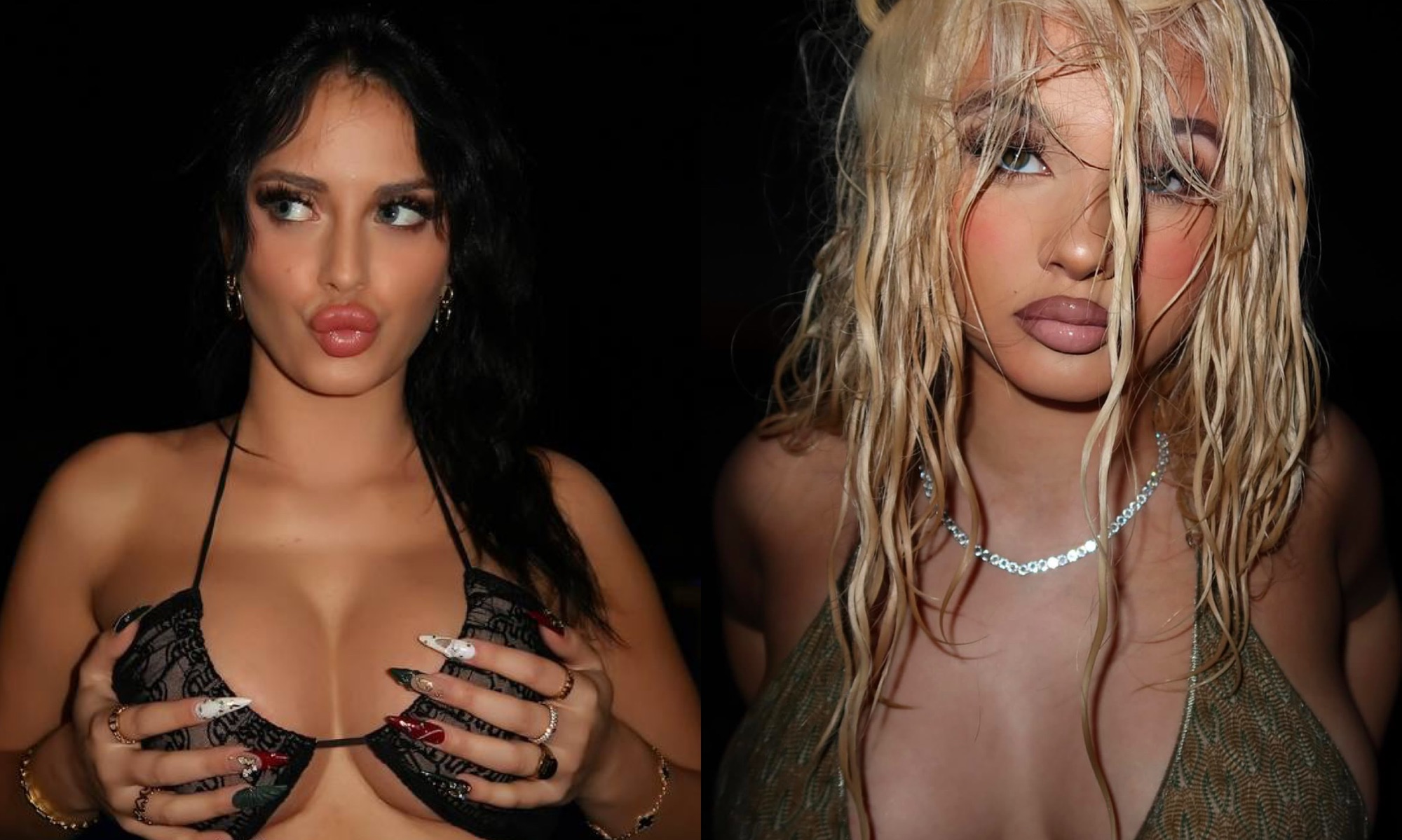Camilla Araujo Sex Tape: Unveiling The Controversy & Privacy Concerns
Is privacy truly a privilege reserved only for those outside the glare of the spotlight, or is it a fundamental human right that should extend to all, regardless of fame or fortune? The recent leak concerning Camilla Araujo and the alleged circulation of a private video underscores a harsh reality: in the digital age, the boundaries between the public and private spheres are increasingly blurred, and the consequences of such breaches can be devastating.
The internet, a realm once envisioned as a boundless expanse of information and connection, has become a double-edged sword. While it offers unprecedented opportunities for communication and self-expression, it also presents fertile ground for the dissemination of intimate content without consent. The case of Camilla Araujo, a rising star in the entertainment world, provides a stark illustration of these complex dynamics. Her name, once associated with talent and burgeoning success, has now become entangled in a controversy that raises profound questions about privacy, consent, and the profound impact of digital breaches on an individual's life.
The story, as it currently unfolds, is not just about the alleged existence of a private video. It is about the exploitation of vulnerability, the violation of trust, and the potential for a person's reputation, career, and mental well-being to be irrevocably damaged by the actions of others. The incident has swiftly become a focal point for broader discussions, igniting a critical debate about the ethics of online conduct, the legal ramifications of non-consensual distribution of private material, and the societal responsibility to protect individuals from the harmful consequences of digital voyeurism.
The specifics surrounding the situation, including the authenticity of the video and the circumstances of its alleged dissemination, are still under examination. However, the very fact that such a private matter has become a subject of public scrutiny highlights the precariousness of privacy in the digital age. The incident underscores the vulnerability of public figures to unwanted attention and the potential for their lives to be dissected and judged by an audience that may not fully grasp the emotional and personal toll of such breaches.
Beyond the immediate details, the Camilla Araujo case delves into the bigger picture of the way society consumes and reacts to celebrity scandals. We must dissect the underlying reasons why such events become a source of public fascination, and explore how the media and public opinion contribute to the narratives that form around these scandals. It requires a serious examination of our individual roles in perpetuating the cycle of curiosity, judgment, and the potential for harm that surrounds incidents of this nature.
| Category | Details |
|---|---|
| Full Name | Camilla Araujo (Assuming, as details are limited) |
| Known For | Rising star in the entertainment industry (Specifics depend on confirmed details) |
| Career Highlights | (This section is currently empty due to a lack of confirmed information) |
| Controversy | Alleged involvement in a leaked private video. This is the primary focus of the current discussion. |
| Legal Status | (This section is currently empty due to a lack of confirmed information) |
| Notable Achievements | (This section is currently empty due to a lack of confirmed information) |
| Associated Topics | Privacy, Consent, Digital Ethics, Celebrity Scandals, Impact of Leaks |
| Further Information | Privacy - Wikipedia (For general information related to privacy) |
The digital world has democratized content creation and dissemination. But, that same democratization has created a context in which private and sensitive information can spread uncontrollably. The story of Camilla Araujo is, therefore, inextricably linked to the issue of digital consent, which is rapidly evolving into a central concern of the digital age. The concept of consent, as it applies to the sharing of intimate content, is paramount. It should be clear, freely given, and able to be revoked at any time. When this consent is absent, or obtained through coercion or deception, the sharing of such content becomes a grave violation of privacy and a potential criminal act.
The legal landscape surrounding the non-consensual distribution of private images and videos is also evolving. Many jurisdictions are enacting laws to criminalize "revenge porn" and other forms of digital harassment. The enforcement of these laws is crucial, and it requires cooperation between law enforcement agencies, social media platforms, and the broader community. But, legal measures alone cannot fully address the root causes of these problems. A broader societal shift is also needed.
The incident demands a collective reevaluation of our attitudes towards privacy. It is a matter of not just respecting personal boundaries, but also understanding the potential harms caused by sharing private material without consent. Its about shifting the narrative surrounding celebrity scandals from one of sensationalism to one of empathy and respect for individual dignity.
The incident is more than just a fleeting headline; it's a reminder of the power of the internet to shape narratives. It challenges us to think critically about the information we consume and share online. This is a call to action to promote media literacy, to question the motives of those who spread potentially harmful content, and to support those whose privacy has been breached. Its a call for greater digital responsibility.
The media, in its coverage of such incidents, plays a pivotal role. The way the media presents the story has a profound impact on public perception. Sensationalistic reporting and the relentless pursuit of clicks and views can exacerbate the harm suffered by individuals, while also contributing to a culture of voyeurism and judgment. A more responsible approach to media coverage is essential, one that prioritizes ethical considerations, respects the privacy of all involved, and avoids the amplification of harmful content.
The rise of social media has amplified the problem. Platforms like Instagram, Twitter, and TikTok have become powerful engines for the spread of information, both accurate and inaccurate. The rapid dissemination of content on these platforms can make it virtually impossible to control the narrative and can lead to a spiral of online harassment and abuse. Social media companies must take responsibility for the content shared on their platforms, and they must develop and enforce strict policies to prevent the spread of harmful material.
The legal framework must also adapt. Laws around cyberbullying, revenge porn, and online harassment must be updated to reflect the evolving realities of the digital age. Governments must work to establish clear guidelines, to prosecute offenders, and to ensure that victims have access to the resources and support they need to rebuild their lives. The incident concerning Camilla Araujo underscores the urgency of this need.
Beyond the legal and technical aspects, a significant shift in societal attitudes is also needed. The emphasis must be shifted towards empathy, respect, and a recognition of the inherent dignity of every individual. The public must resist the urge to sensationalize and judge, and instead offer support to those who have been affected by the leaks. This includes acknowledging the potential for serious mental health consequences, as well as the difficulties involved in navigating the aftermath of a privacy breach.
One of the core elements of this discussion involves the concept of consent, not only within personal relationships but also in how the public consumes information. It is important to examine the power dynamics that come into play when public figures are concerned. When someones private life is put in the public eye without their permission, the potential for emotional distress, career damage, and erosion of trust is substantial.
The leak has prompted critical introspection about the long-term effects on a person's career. In an industry that is already competitive and often judgmental, the revelation of private material could have far-reaching and possibly devastating implications. Future opportunities, career trajectory, and public image could be affected by the incident. This underscores the importance of supporting individuals like Camilla Araujo, providing them with the space and resources to navigate the aftermath.
The case also brings to light the responsibility of those who might be in the position to view or share such material. Sharing private content without consent not only violates legal boundaries but can also cause profound harm to the person involved. The decision to share such content should be carefully reconsidered, as the implications extend beyond the immediate moment, potentially impacting a person's mental health, relationships, and reputation.
The Camilla Araujo story, and others like it, show the significance of fostering a digital environment in which everyone is treated with dignity and respect. It is the responsibility of individuals, communities, and authorities to join together to create a digital world that safeguards privacy, protects individuals from harm, and encourages open dialogue.
The incident surrounding Camilla Araujo compels us to reflect on the ethics of our digital behavior. The power of the internet should be used to inform and engage, rather than to inflict damage. We must become advocates for a more considerate and understanding society, where privacy is highly valued, and where individuals are supported.
The incident is a wake-up call for a collective change, a catalyst for deeper discussions about digital responsibility, and a call to action for creating a more just and empathetic society. The conversation needs to move beyond just the sensationalism and towards protecting the rights and dignity of individuals in the digital age.
The story of Camilla Araujo is not just one of a single individual. It is part of a bigger story, the story of digital ethics, privacy, and consent. It's a story that affects us all.


